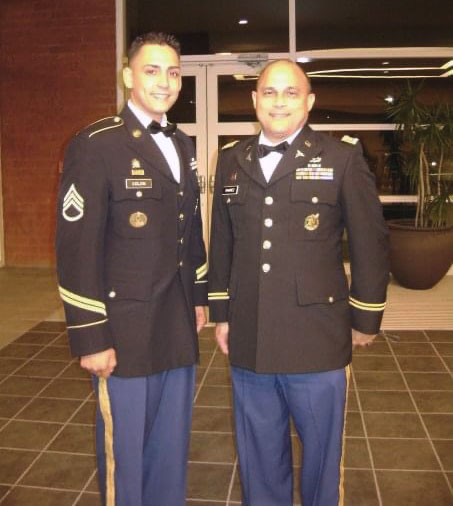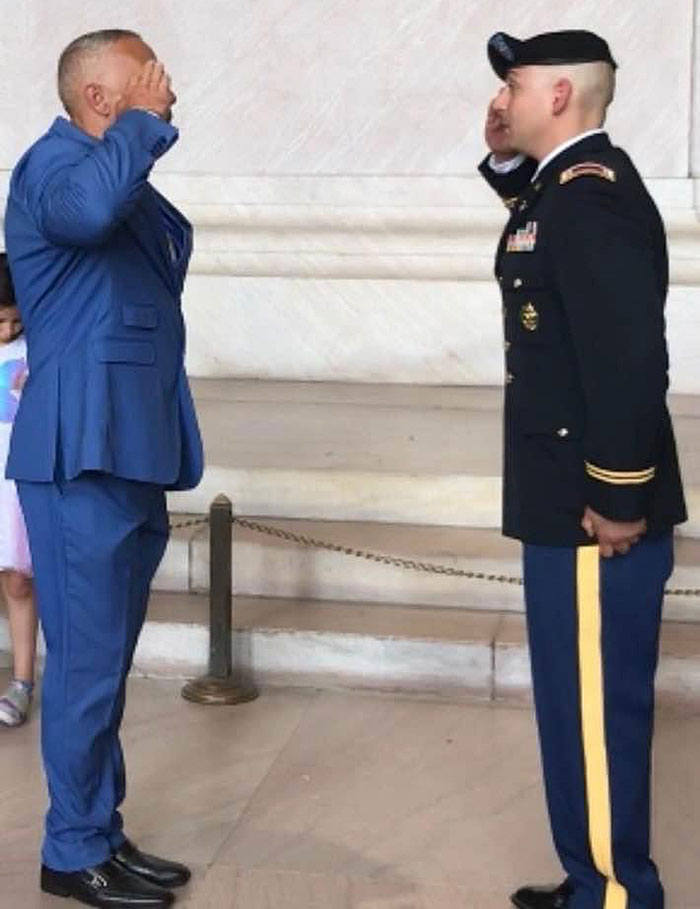USAISR's Colon Pairs Positivity, Intensity for Maximum Impact
This article represents the latest in a series of personal interest stories designed to spotlight notable people, stories and achievements across the U.S. Army Medical Research and Development Command. If you would like to recommend a specific Soldier or civilian employee for this series, please contact Ramin A. Khalili, USAMRDC Public Affairs Office Writer, at ramin.a.khalili.ctr@health.mil

Talk to 1st Lt. Nelson Colon for five minutes and you wonder how long he can keep up the pace. Colon, who currently serves as the company commander at the U.S. Army Medical Research and Development Command's Institute of Surgical Research, moves fast and talks faster – seemingly always on his way to tackle some new and different task. Talk to him for a little bit longer, however, and it becomes apparent that this is his pace – nonstop energy, nonstop intensity. For Colon, it's a personality trait that's become his calling card.
"You have to lead yourself to be the best version of yourself," he says with vigor. "In many ways, it's our job to be just that for the benefit of other people."
It's the service and attention to other people that drives Colon's personal and professional routine. After a 22-year career in the military, it's still the reason he wakes up in the morning, still the reason he seeks out every opportunity to, as he says, "affect change" with as many Soldiers, civilians, contractors and community members as possible. (For example, during our phone conversation he notes that he spent the majority of his morning in a deep discussion with several other Soldiers about the book "Who Moved My Cheese?" – the bestselling 1998 parable about adapting to change and stressful situations.)
Born in Kansas to parents who relocated from Puerto Rico, Colon's father served in the Army – attaining the rank of Sergeant Major – before retiring to serve as pastor in a local church. He admits his father's guiding forces in life – the military, his faith – would eventually become his own and, in turn, pave the way for future success.
"I always looked up to my father – he was inspiring," says Colon, noting that his father's focus on effective problem solving is still the key to his worldview. "I would wake up and do PT – I would go for runs with him. I wanted to be like him."
But it wasn't until Colon was several years into his Army career, serving as a Brigade Sergeant Major with the U.S. Army Recruiting Command, that he felt pulled in a different direction. Perhaps in a different role, he thought, he could have a more personal, and potentially greater, impact on the Soldiers around him. So in a rather unique move – one that he admits was non-traditional – Colon stepped into the role of company commander; a position he's held at USAISR since May of this year. The results have been nothing short of transformational for Colon, who now gets to combine both his passion for people – some 200-plus Soldiers at USAISR, to be exact – and his passion for the Army mission.
"It's not about power, it's about influence – it's about who chooses to follow you," says Colon of his decision to change course mid-career. "Being positive and understanding what makes people tick, what challenges they're facing – that yields a holistic approach to being able to solve almost any issue."

That's where Colon finds himself now, able to enact change at the ground level: focusing on Soldiers' own personal and professional lives, and trying to help them find a balance between the two. Colon has even developed his own personal acronym for these purposes, developed to help remind younger Soldiers of the importance of self-improvement. His creation, "FLAG", stands for Family, Leadership, Ambassadorship and Growth; all things that have helped lead Colon to where he is today.
"Professionally, he's a very self-aware and deliberate – emphasis on deliberate – leader, who attains his goals through power and influence as opposed to sheer dominance and authority," says Capt. Matthew Morrow, chief of Burn Center Administrations at USAISR, of Colon. "He's the person I would say that every Soldier seeks to be in that he has achieved and maintains that perfect work-life balance."
That's high praise from Morrow, a friend and colleague who served as company commander at USAISR directly prior to Colon. From his perspective, Morrow sees Colon as a thorough and dedicated leader; one who praises as much as he disciplines, one whose leadership style and influence extends beyond the standard duty day. It's that kind of round-the-clock commitment, says Morrow, that allows for the constant and direct communication required to help mold and shape junior and senior leaders at a granular level.
"He's not the kind of guy who just scratches the surface – instead, he traces the initial problem to its roots," says Morrow of Colon's approach to mentorship. "I've personally seen many interactions where Soldiers seek his advice for one issue, and then leave with growth and development and inspiration in other areas – taking with them personal tools they may not have had before."
It's an incredible journey for Colon, a man who joined the Army at 17 years old ("My parents had to sign the recruiting papers with me," he says with a chuckle). Back then he was quite literally just a boy looking for direction. Now, he's become the kind of leader that his younger self would have hoped for. Good thing he's sitting where he is today then – quickly hopping from task-to-task, person-to-person, eager to affect change. For Colon, every day is both a gift and a lesson – a chance to improve both yourself and everyone around you, too.
"Who we were yesterday, who we were a week ago or a month ago – that's not who we are now," he says. "And so I'm always looking to identifying whatever I can to be better, both in a personal aspect and in a professional, military aspect."
 An official website of the United States government
An official website of the United States government
 ) or https:// means you've safely connected to the .mil website. Share sensitive information only on official, secure websites.
) or https:// means you've safely connected to the .mil website. Share sensitive information only on official, secure websites.


